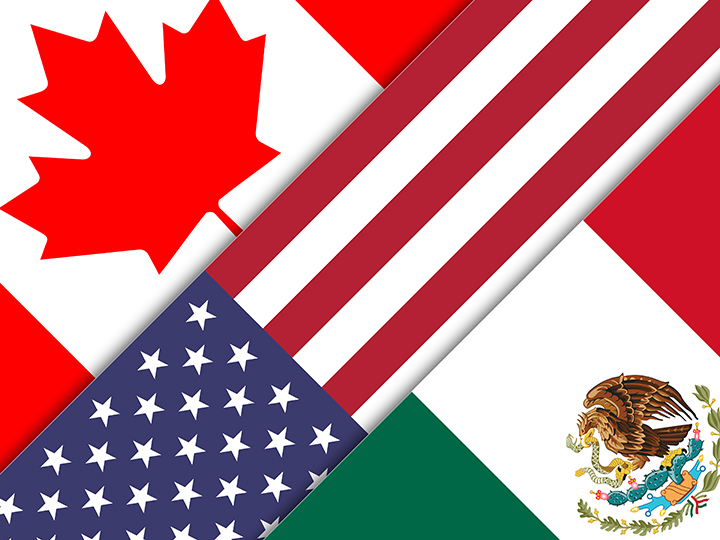WASHINGTON — The United States-Mexico-Canada Agreement (USMCA) went into effect at 12 a.m. today (Wednesday, July 1), replacing the North American Free Trade Agreement (NAFTA).
In a June 30 statement, U.S. Customs and Border Protection (CBP) said the new agreement will facilitate more efficient trade, stronger enforcement and more economic opportunities for North America. The USMCA includes updated rules regarding origin, customs administration and trade-facilitation provisions, intellectual property rights protections and fair labor conditions.
“The USMCA completely replaces NAFTA and marks the beginning of a new era of American prosperity,” said Mark Morgan, acting commissioner of CBP. “Thanks to President Trump’s leadership and his ability to secure the bipartisan support of Congress, the USMCA delivers a tremendous win for American businesses and consumers.”
Brenda Smith, executive assistant commissioner of CBP Office of Trade, described the new trade rules as “the new global standard,” adding that USMCA will help CBP carry out its mission of trade facilitation and enforcement.
“CBP will continue to work closely with the trade community, our U.S. government partners and our Mexican and Canadian counterparts to ensure a smooth transition from NAFTA and support the prosperity of the U.S. economy, American workers and public safety,” Smith said.
In the months before the implementation of USMCA, CBP has worked to prepare the U.S., Canada and Mexico for the transition.
In March, CBP launched the USMCA Center, an online resource that provides an overview of the agreement along with information about regulations and implementation, compliance guidance and more. Compliance guidance is available in a variety of mediums, including videos, webinars and fact sheets. The USMCA Center website also offers “smart” search engine chatbot to will help users find answers to common questions.
CBP’s Commercial Customs Operations Advisory Committee (COAC) launched two working groups to hear concerns and recommendations from the private sector on USMCA implementation and the specific new criteria for the automotive rules of origin.
USMCA has drawn support from organizations representing the trucking industry.
Jim Hoffa, general president of the Teamsters union, praised the agreement, saying he believes USMCA will ensure safer roadways and increased labor rights for workers.
“For the first time today, Teamster truckers will have protections on the job that they haven’t had in at least a quarter century thanks to the enactment of this new trade pact,” Hoffa said.
“From the get-go, securing an overdue fix to the cross-border trucking provision that threatened highway safety and the competitiveness of the American trucking industry was essential for this union,” he continued. “The North American Free Trade Agreement (NAFTA) had made roadways less safe due to allowing older, Mexican-domiciled trucks on them.”
Todd Spencer, president of the Owner-Operator Independent Drivers Association (OOIDA) also applauded the implementation of USMCA.
“The USMCA creates a thorough review process to identify and remove Mexico-based carriers and operators that pose material economic harm to American truckers. This means greater scrutiny of entities in cross-border trucking and enforcement of labor provisions,” Spencer said. “This will hopefully prevent or reduce Mexico-domiciled carriers that are exploiting our laws from operating on U.S. highways, which has significantly lowered wages for American drivers across numerous segments of trucking.”
USMCA establishes a federal review process that would restrict unsafe carriers from operating beyond the Border Commercial zones. In addition, the agreement requires the inspector general of the U.S. Department of Transportation (USDOT) to review actions taken by the U.S. Secretary of Transportation to ensure that each Mexico-domiciled motor carrier with operating authority complies with federal motor carrier safety laws and regulations. The USDOT is required to conduct a survey of all existing grants of operating authority to, and pending applications for operating authority from, all Mexico-domiciled motor property carriers for operating beyond the Border Commercial Zones, including OP-1 (MX) and OP-1 operating authority.
Chris Spear, president and CEO of American Trucking Associations (ATA) described USMCA as “the first significant revision in our nation’s trading relationship in nearly three decades,” adding that he believes the agreement will foster growth in all three countries.
USMCA is expected to increase annual U.S. exports to Canada and Mexico by a combined $33 billion above the current NAFTA baseline. The agreement is also expected to increase the U.S.’s gross domestic product by $68 billion, stimulating broad sectors of the economy that the trucking industry services such as agriculture and manufacturing, according to ATA.
Information from the Office of the U.S. Trade Representative describes USMCA as “a mutually beneficial win for North American workers, farmers, ranchers, and businesses,” noting that the agreement is designed to create balanced, reciprocal trade that will support American jobs and improve North American economy.
To read the full agreement between the U.S., Canada and Mexico, which was signed Nov. 30, 2018, click here.
Linda Garner-Bunch has been with The Trucker since 2020, picking up the reins as managing editor in 2022. Linda has nearly 40 years of experience in the publishing industry, covering topics from the trucking and automotive industry to employment, real estate, home decor, crafts, cooking, weddings, high school sports — you name it, she’s written about it. She is also an experienced photographer, designer and copy editor who has a heartfelt love for the trucking industry, from the driver’s seat to the C-suite.















Trucking industry, U.S. border agency weigh in as USMCA takes effect, replacing NAFTA
Comment